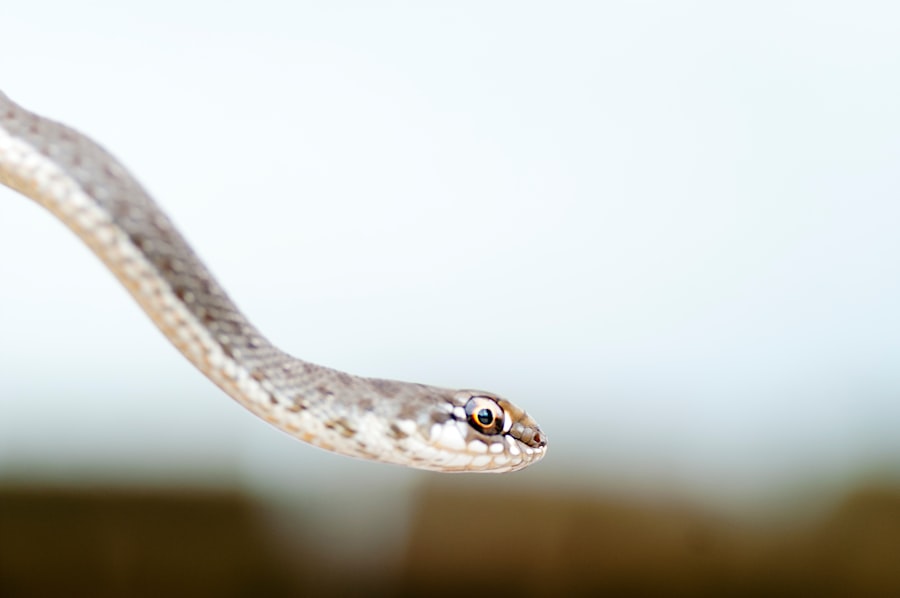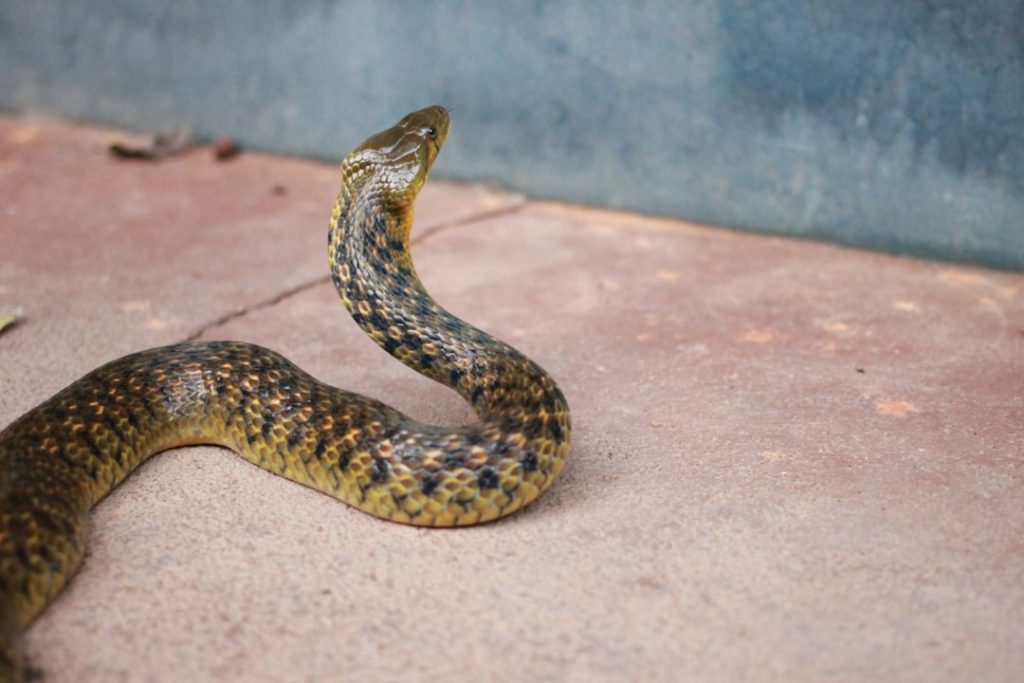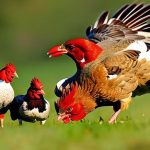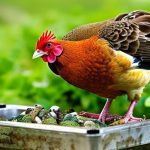Snakes present a notable risk to chicken safety and health. Understanding snake behavior and habits is essential for effective coop protection. Chicken coops attract snakes due to the availability of food sources such as eggs, chicks, and adult chickens.
Coops also provide warm, sheltered hiding spots for snakes. While not all snakes are harmful, it is important to identify venomous species that may endanger the flock. Recognizing the threat snakes pose allows for proactive measures to secure the coop and protect chickens.
Snakes are opportunistic predators that exploit vulnerabilities in coop security. Their excellent climbing abilities and ability to navigate small openings necessitate thorough inspection of the coop for potential entry points. Snakes are also skilled at concealment, often remaining undetected until it is too late.
By comprehending the threat posed by snakes, chicken owners can implement effective strategies to safeguard their flock and create a secure environment for their chickens to thrive. Education about snake behavior and habits enables the development of appropriate protective measures.
Table of Contents
- 1 Secure your coop: Fortify your chicken enclosure
- 2 Eliminate hiding spots: Keep your property clear of potential snake habitats
- 3 Use natural deterrents: Utilize plants and other natural methods to repel snakes
- 4 Install physical barriers: Create obstacles to prevent snakes from entering the coop
- 5 Monitor and remove: Regularly check for signs of snake activity and take action if necessary
- 6 Educate yourself and others: Share knowledge and resources to protect your chickens from snakes
- 7 FAQs
- 7.1 What are some effective ways to keep snakes from killing chickens?
- 7.2 What are some natural snake repellents that can be used to keep snakes away from chickens?
- 7.3 What are some signs that indicate a snake may be targeting chickens?
- 7.4 What should I do if I find a snake in or near my chicken coop?
- 7.5 Are there any breeds of chickens that are more resistant to snake attacks?
Key Takeaways
- Snakes pose a threat to chicken coops and it’s important to understand their behavior and habits to effectively protect your flock.
- Fortify your chicken enclosure with secure fencing and hardware cloth to prevent snakes from entering and preying on your chickens.
- Keep your property clear of potential snake habitats such as tall grass, wood piles, and debris to eliminate hiding spots for snakes.
- Utilize plants like marigolds, wormwood, and garlic, as well as natural methods like essential oils, to repel snakes from your property.
- Create physical barriers such as snake-proof mesh and door sweeps to prevent snakes from entering the coop and harming your chickens.
- Regularly monitor your property for signs of snake activity and take immediate action to remove any snakes that pose a threat to your chickens.
- Educate yourself and others about snake behavior and effective methods for protecting chicken coops, to ensure the safety of your flock.
Secure your coop: Fortify your chicken enclosure
Inspect and Seal the Perimeter
Start by inspecting the perimeter of your coop for any gaps or openings that could serve as entry points for snakes. Seal any holes or cracks with hardware cloth or wire mesh to prevent snakes from slithering into the coop.
Secure Doors and Windows
Ensure that all doors and windows are securely closed at night to prevent snakes from entering the coop while your chickens are roosting. Consider installing automatic door closers to ensure that the coop is tightly sealed after dark, providing an extra layer of security for your flock.
Physical Barriers for Added Protection
Another important aspect of fortifying your chicken enclosure is to bury hardware cloth or wire mesh around the perimeter of the coop. Dig a trench around the coop and bury the mesh at least 12 inches deep to prevent snakes from burrowing underneath and gaining access to the coop. This physical barrier will deter snakes from attempting to enter the coop from below, providing added protection for your chickens.
By following these steps, you can create a secure environment that minimizes the risk of snake attacks and ensures the safety of your flock.
Eliminate hiding spots: Keep your property clear of potential snake habitats

Snakes are attracted to areas with ample hiding spots and shelter, making it essential to keep your property clear of potential snake habitats. Remove any piles of debris, such as wood or rocks, that could serve as hiding spots for snakes. Keep the area around the coop well-maintained and free of clutter to minimize potential hiding spots for snakes.
Additionally, trim back overgrown vegetation and bushes near the coop to eliminate potential hiding spots for snakes. By keeping your property clear of potential snake habitats, you can reduce the likelihood of snakes taking up residence near your coop and posing a threat to your chickens. It’s also important to address any rodent infestations on your property, as rodents can attract snakes in search of food.
Implement measures to control rodent populations, such as securing food sources and using traps if necessary. By eliminating potential food sources for snakes, you can reduce the likelihood of them being drawn to your property and posing a threat to your chickens. By keeping your property clear of potential snake habitats and addressing rodent infestations, you can create a less appealing environment for snakes and minimize the risk of them posing a threat to your flock.
Use natural deterrents: Utilize plants and other natural methods to repel snakes
In addition to fortifying your coop and eliminating hiding spots, you can utilize natural deterrents to repel snakes from your property. Certain plants are known for their ability to repel snakes due to their strong scent or toxic properties. Consider planting marigolds, wormwood, or garlic around the perimeter of your coop to deter snakes from approaching.
These plants emit strong odors that snakes find unpleasant, making them less likely to venture near your coop. Additionally, consider spreading a layer of mulch made from cedar or cinnamon around the coop, as these materials are also known for their ability to repel snakes. Another natural method to repel snakes is by using essential oils with strong scents that snakes find unpleasant.
Peppermint oil, clove oil, and cinnamon oil are all effective at deterring snakes and can be applied around the perimeter of the coop as a natural repellent. These natural deterrents provide an additional layer of protection for your chickens by creating an environment that is unappealing to snakes. By utilizing plants and other natural methods to repel snakes, you can further enhance the security of your coop and minimize the risk of snake attacks on your flock.
Install physical barriers: Create obstacles to prevent snakes from entering the coop
Installing physical barriers around your coop is an effective way to create obstacles that prevent snakes from entering the enclosure. Consider placing snake-proof fencing around the perimeter of the coop to create a barrier that deters snakes from approaching. Snake-proof fencing is typically made from sturdy materials such as galvanized steel or heavy-duty wire mesh that is difficult for snakes to penetrate.
This type of fencing provides a strong physical barrier that prevents snakes from gaining access to the coop, ensuring the safety of your chickens. Another physical barrier that can be installed is a snake-proof apron around the perimeter of the coop. A snake-proof apron consists of a wide strip of hardware cloth or wire mesh that extends outward from the base of the coop, creating a barrier that prevents snakes from slithering underneath.
Bury the apron at least 12 inches deep and extend it outward at a 90-degree angle to create an effective barrier against burrowing snakes. By installing physical barriers such as snake-proof fencing and aprons, you can create obstacles that prevent snakes from entering the coop and posing a threat to your flock.
Monitor and remove: Regularly check for signs of snake activity and take action if necessary

Identifying Snake Activity
Inspect the perimeter of the coop for any signs of snake tracks or shed skin, as these are indicators that snakes may be present in the area. Additionally, keep an eye out for any potential entry points or areas where snakes could be hiding, such as under rocks or in tall grass.
Taking Proactive Measures
By regularly checking for signs of snake activity, you can take proactive measures to address any potential threats before they escalate. If you do encounter a snake on your property, it’s important to take action to remove it safely and humanely.
Safe Snake Removal
Avoid approaching or attempting to handle the snake yourself, especially if you are unsure of its species or venomous nature. Instead, contact a professional wildlife removal service or animal control agency to safely remove the snake from your property. By taking swift action to remove any snakes from your property, you can minimize the risk of them posing a threat to your chickens and create a safer environment for your flock.
Educating yourself and others about effective strategies for protecting chickens from snakes is crucial in creating a community of informed poultry keepers who can work together to minimize the threat of snake attacks. Share knowledge and resources with fellow chicken owners about identifying venomous snake species in your area and implementing proactive measures to secure coops and deter snakes. By sharing information about effective deterrents and physical barriers, you can help others fortify their coops and protect their flocks from potential harm.
Additionally, consider organizing workshops or informational sessions about snake safety for chicken owners in your community. Invite local wildlife experts or animal control professionals to share their expertise on identifying and safely removing snakes from properties. By educating yourself and others about effective strategies for protecting chickens from snakes, you can work together to create a network of informed poultry keepers who are equipped with the knowledge and resources needed to safeguard their flocks from potential threats.
If you’re looking for ways to keep snakes from killing your chickens, you may also be interested in learning how to care for goslings. Check out this article for tips on raising and caring for goslings on your farm.
FAQs
What are some effective ways to keep snakes from killing chickens?
Some effective ways to keep snakes from killing chickens include keeping the chicken coop and surrounding area clean and free of debris, using snake-proof fencing around the coop, and using snake repellents or traps.
What are some natural snake repellents that can be used to keep snakes away from chickens?
Some natural snake repellents that can be used to keep snakes away from chickens include essential oils such as cinnamon, clove, and cedar, as well as plants such as marigolds and wormwood.
What are some signs that indicate a snake may be targeting chickens?
Some signs that indicate a snake may be targeting chickens include finding shed snake skins near the coop, noticing a decrease in the chicken population, and finding eggs or chicks that have been eaten or killed.
What should I do if I find a snake in or near my chicken coop?
If you find a snake in or near your chicken coop, it is important to remove the snake safely and relocate it to a more suitable habitat. It is also important to inspect the coop for any potential entry points and take measures to secure them to prevent future snake infestations.
Are there any breeds of chickens that are more resistant to snake attacks?
While no chicken breed is completely immune to snake attacks, some breeds such as the Brahma, Sussex, and Orpington are known to be more alert and better at defending themselves against predators, including snakes.
Meet Walter, the feathered-friend fanatic of Florida! Nestled in the sunshine state, Walter struts through life with his feathered companions, clucking his way to happiness. With a coop that’s fancier than a five-star hotel, he’s the Don Juan of the chicken world. When he’s not teaching his hens to do the cha-cha, you’ll find him in a heated debate with his prized rooster, Sir Clucks-a-Lot. Walter’s poultry passion is no yolk; he’s the sunny-side-up guy you never knew you needed in your flock of friends!







